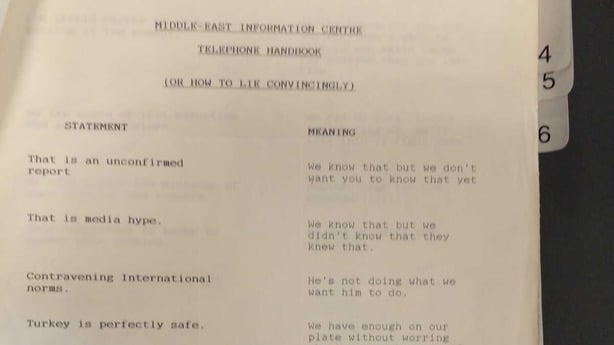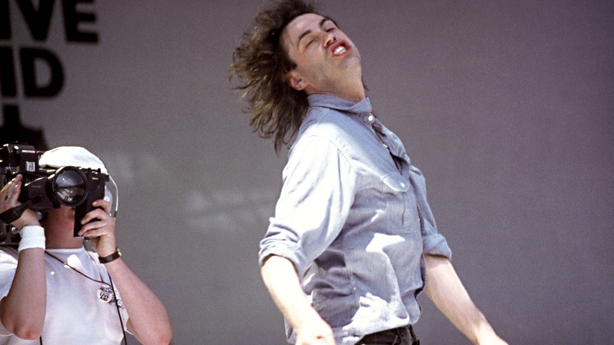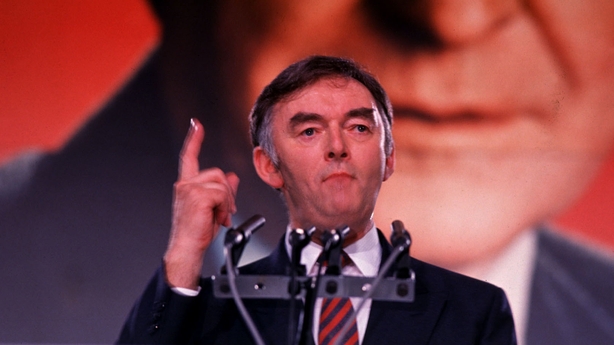By David McCullagh, Conor McMorrow and Justin McCarthy
The State Papers are the secret letters, memos and minutes written by politicians and civil servants as they wrestled with the problems of the day. They were not meant for the eyes of the public – until now.
Here are eight things we learned from the latest tranche of documents:
1. Mind-boggling South African safari
"Mind-boggling" and "rubbish": John Bruton didn't pull his punches when he heard about a plan to bring the North’s political leaders on safari to South Africa.
The February 1997 proposal to hold a seminar of Northern Ireland’s political party leaders at a remote game reserve in South Africa was not to the taoiseach’s taste: "This is rubbish. It is the sort of indulgence that adds to the problem. It’s rewarding intransigencies to fly people abroad who won’t do business at home. JB".
The South Africa seminar was proposed by Professor Padraig O’Malley, of the University of Massachusetts in Boston. It was suggested that it take place over a weekend from 27 February to 3 March, and that "senior members of all the Northern Ireland parties have expressed interest in attending".
Professor O’Malley was inviting the leader or deputy leader of each party to attend the seminar in "a remote game reserve". Funding from bodies such as the Ireland Funds had been arranged to cover transport, while the South African Government was going to cover all costs in South Africa.
An internal government fax dated 16 January 1997 about the 'Possible South Africa Seminar" states: "On a lighter note, I mentioned to you that in the interests of togetherness it is envisaged that the NI politicians would take part collectively in a midnight game-hunting expedition". In a handwritten note beside this, the taoiseach wrote: "The mind boggles!"
2. Robinson’s dirty kitchen
Taoiseach Charles Haughey ordered the suppression of an engineer’s report highlighting the alarming condition of Áras an Uachtaráin when Mary Robinson first took over as president.
On her arrival in 1990, Mrs Robinson was not impressed with the cleanliness of the Áras, informing staff that "a good cleaning job was required".
The report, which was shown to the taoiseach Charles Haughey, raised serious fire safety concerns
The new president, apparently concerned about the state of the building, also commissioned a private engineer’s report, which stated that urgent action was required to ensure the building was "safe for habitation" before her family moved in.
The report, which was shown to the taoiseach Charles Haughey, raised serious fire safety concerns, with the engineer stating that the "health and safety authorities would have no option but to condemn the building".
Haughey ordered that the report should be hushed up – or, as the civil servants put it, "not circulated, except on a very strict need to know basis".
He commissioned a second report by the Office of Public Works, which downplayed many of the original concerns raised by the President.
3. Doublespeak in the Department of Foreign Affairs
"In war", the saying goes, "truth is the first casualty". To illustrate this, and the fact that civil servants in the Department of Foreign Affairs appear to have a black sense of humour, a document was circulated during the Gulf war in 1991, entitled "Middle East Information Centre – Telephone Handbook (Or how to lie convincingly)".
The document offers a series of statements, and then explains what each of them really means. For example, "That is an unconfirmed report", means "We know that, but we don’t want you to know yet".

"We are monitoring the situation" means "We are watching the news", while "We are seeking clarification" means "We have switched over to Sky News".
The phrase "Contravening International norms" means "he’s not doing what we want him to do", and our personal favourite, "That is media hype", which means "We know that, but we didn’t know that they knew that".
4. No Nobel nod for the Boomtown brat
Boomtown Rats frontman Bob Geldof wasn't to know it at the time, but during an interview with Norwegian television in the late 1980s, he talked himself out of being nominated by the Irish Government for the Nobel Peace Prize.
In January 1987, taoiseach Garret FitzGerald proposed that the Irish Government should recommend the musician for the Nobel Peace Prize for the second year running, because it was thought he narrowly missed out the previous year.
The taoiseach wrote to tánaiste Dick Spring: "As a further mark of recognition for his sustained efforts I wish to propose that we again jointly nominate Mr Geldof for the 1987 Nobel Peace Prize."
Geldof helped raise millions in famine relief in 1985 after organising the Live Aid benefit concerts in London and Philadelphia.

Despite this, Irish civil servants were not convinced of his chances of winning, and sought the advice of Ireland’s ambassador to Copenhagen, which also covered Oslo, the home of the Norwegian Nobel Committee.
Ambassador Liam Rigney attributed Geldof's failure to win the previous year to the "age and general background" of the opinionated frontman.
He said these "speculations" were confirmed by Mr Geldof himself, in a Norwegian television interview, which would turn out to be somewhat of a "rat trap", snaring the singer's chances of another go at the Peace Prize.
The Ambassador said: "Mr Geldof was asked why he felt he had not been successful (in winning the Nobel Peace Prize). He replied, in his usual forthright manner, that perhaps the Committee regarded him as too young and, in view of his track record, the type of person whose lifestyle may in the future involve him in incidents which would not be regarded as in keeping with a Nobel Prize winner."
The Ambassador said: "I feel one cannot discount Mr Geldof’s own remarks, and I suspect they may lie somewhere near the truth. All things considered, I would be very slow to recommend the renomination of Mr Geldof for the Nobel Peace Prize this year."
Officials in Dublin agreed, urging the taoiseach that the matter should be "let drop."
The idea was not pursued any further.
5. Irish workers used as human shields
An Irish engineering firm complained that its staff were being used as "human shields" in an Iraqi prison in late 1990, in a bid to deter the planned invasion of Iraq by western forces.
Secret State files reveal that the group chief executive of MF Kent, Gus Kearney, appealed for help to taoiseach Charles Haughey in 1990 for the safe release of employees who were detained by the Iraqi authorities ahead of the expected invasion by the US military.
Two of them were Irish passport holders, whom he said were being held as "human shields". Mr Kearney also claimed his workers were "the poor relation" compared with workers at Parc, a company owned by Aer Lingus which operated a hospital in Baghdad.
Documents show 25 Parc staff got exit visas to leave Iraq on 14 November 1990, with Mr Kearney claiming: "We have failed to secure a single exit visa despite the fact that our work is complete and our employees have nothing to do."
The State files do not indicate the Government’s response to Mr Kearney’s letter. However, several days earlier the Irish ambassador in Baghdad, Antóin Mac Unfraidh, asked if he should seek approval from the Iraqi authorities for MF Kent staff to leave on the same flight as their German work colleagues.
Read more:
State Papers 1994-97: Ceasefire breakdown tests Bruton-Major relations
Politicians behaving badly
'Foolishly impaled': RUC’s view of decommissioning demands
6. Roger Casement’s missing guns
German guns, seized from Roger Casement when he arrived in Kerry by U-boat in 1916, were improperly sold, or may have been "illegally exported" in 1990.
Confidential documents released from the National Archives tell the story of a US gun collector who somehow obtained the weapons, which had been stored in a depot at Clancy Barracks.
The collector wrote to Ireland’s Genealogical Office seeking further information about Casement – including photographs of the medals awarded to him by Ireland after his execution in London for high treason against the Crown in the weeks following the Easter Rising.
'it would seem that they were improperly obtained at some stage and have, perhaps, been illegally exported'
The collector told how he had obtained the "Navy Luger pistols" held at Clancy Barracks. "I recognised their immense historical value and, since that time, at long last, was able to negotiate for them in 1990, and was in Dublin last January to conclude the matter and ship them here."
The matter was raised with the Department of the Taoiseach where a civil servant wrote of the weapons: "...it would seem that they were improperly obtained at some stage and have, perhaps, been illegally exported.
"In the circumstances, I do not think there can be any question of facilitating the present holder as proposed."
7. Pee Flynn wears insults for peace
There is a price to be paid for peace. Sometimes, it can even include turning the other cheek when your hero is insulted.
At least according to justice minister Padraig Flynn. In September 1992, he was on an Irish delegation, led by taoiseach Albert Reynolds, which met British prime minister John Major and northern secretary Patrick Mayhew in London.

Mayhew urged both sides not to lose heart despite setbacks and criticisms.
Such criticism could hurt – deeply – according to minister Flynn, who highlighted its impact by referring to himself in the third person:
"I have sat there (at the talks) and been insulted. My party has been insulted. Éamon de Valera has been insulted. I say to myself: 'Hold your peace, Flynn'. There is a huge prize here (peace). Let us do the decent thing and work for an agreement."
8. Major's Messiah
When Irish officials were planning the evening entertainment for a pre-Christmas visit by the British prime minister John Major to Dublin in 1995, concerns were raised about the theatrical offerings available in the capital at the time.
The choices included several pantomimes: Aladdin, in the Gaiety, and The Adventures of Chez Mouse, in the Peacock.
There was also the musical, The King and I, which was running in the Olympia Theatre, and the Bjorn Again Christmas Show in The Point, which officials helpfully explained was "a pop show take-off of ABBA".
In the end they settled on a performance of Handel’s Messiah in the National Concert Hall. Documents from the National Archives show the evening also involved a stage-managed visit to a pub, which had been discussed between officials who suggested the two leaders, Mr Major and taoiseach John Bruton, should walk from Government buildings to Doheny and Nesbitt’s pub on Baggot Street, where they could be photographed "imbibing pints of Guinness/Murphy’s/Beamish".
the reception given by the audience at the NCH to Mr Major was 'genuinely moving'
Instead, the "spontaneous" visit was to Foley’s bar on Merrion Row, where staff from the taoiseach’s private office, constituency office, and protocol section, as well as the Government secretariat were waiting like movie extras "for atmosphere."
The evening, it seems, was a success.
It was described by Mr Major in letter to the taoiseach on 22 December 1995 as "a truly marvellous evening". The prime minister said his wife Norma told him that it was "one of the most enjoyable evenings she had had in the past five years".
Mr Major’s private secretary, Roderic Lyne, also echoed the compliments. In a letter to civil servants he claimed the reception given by the audience at the NCH to Mr Major was "genuinely moving – even to a hard-bitten old Stalinist". Lyne was presumably referring to himself, rather than the prime minister, as an old Stalinist.
Based on documents now available to view in the National Archives of Ireland.

